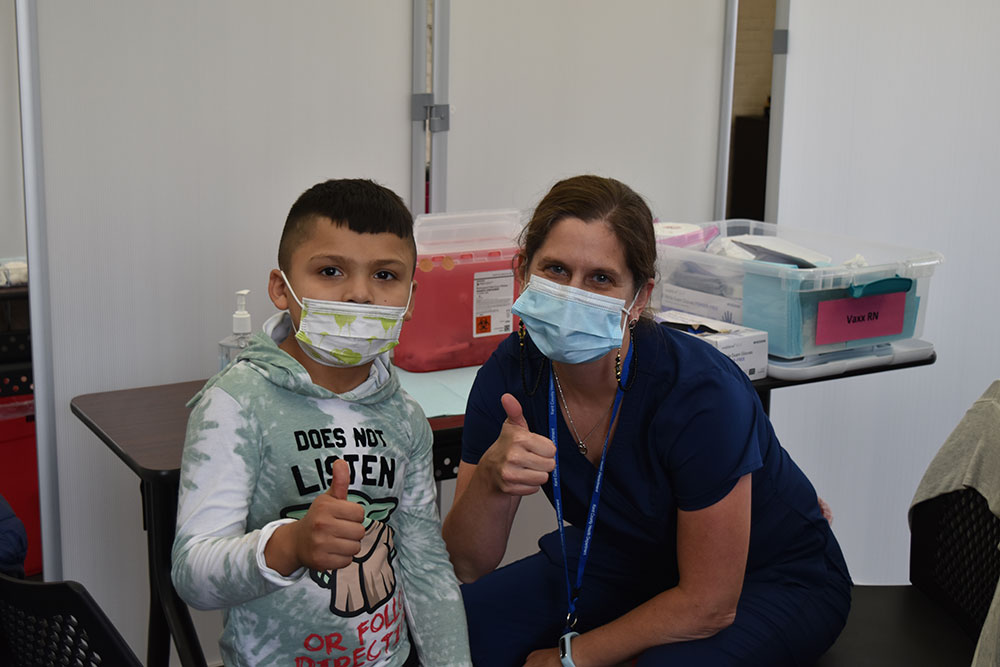Overcoming Barriers to Vaccination: The Hispanic Center of Western Michigan
Vaccination rates for Hispanics are often lower than rates for other racial and ethnic groups.
Efforts to encourage COVID-19 vaccination among Hispanic populations in the United States often face substantial barriers. These barriers include access to information about the vaccines, language accessibility, and transportation challenges. Additionally, many individuals within these groups lack health insurance and state identification, which pharmacies and other clinics often request. The Hispanic Center of Western Michigan (The Hispanic Center) is a nonprofit organization working to remove barriers to getting vaccinated. The region it serves includes Grand Rapids, the largest city in western Michigan and the second-largest city in the state. Hispanic people make up nearly 17% of the population of Grand Rapids, which is comparable to the overall population of Hispanic people in the U.S. (18%).
The Hispanic Center collaborated with Michigan’s Community Foundation of the Holland/Zeeland Area, the University of Michigan Health-West, and the Kent County Health Department to provide COVID-19 vaccines to Hispanic residents from November 2021 through January 2022 via weekly mobile vaccine clinics. In total, 165 doses were administered in November and increased to more than 330 doses per month in December and January. To ensure success, these organizations had to be intentional about addressing the following barriers to vaccination.

The Hispanic Center worked to build community trust by sharing flyers conveying COVID-19 information in grocery stores and homes, and by having one-on-one conversations with many of the people receiving the information. Center staff also provided information at school meetings, and they regularly shared information and videos on social media. Further, the Hispanic Center assists multiple organizations with translating and interpreting COVID-19-related materials, including information from the Centers for Disease Control and Prevention (CDC) and local health departments. It can translate over 80 languages and has a team of over 50 interpreters. Interpreters, assisted nurses, and Spanish-speaking volunteers helped people with vaccination registration and in understanding the overall process. In addition, the center worked with bilingual doctors and community members to create educational videos in Spanish about COVID-19 vaccination. This content was shared by local and trusted Spanish-speaking media outlets.
To address transportation-related challenges, the Hispanic Center provided bus passes for people coming to the mobile vaccination site in the center’s parking lot. The center also contracted a bus for two months to pick people up from their homes and bring them to the site.
Finally, the Hispanic Center eliminated the requirement of state identification and/or proof of health insurance at vaccine clinics. This was extremely important because Hispanic people are the largest population segment without health insurance coverage in the nation. Hispanic people with undocumented immigration status may fear their information will be recorded and shared with immigration authorities.
This collaboration was successful because governmental institutions and healthcare providers partnered with community-based organizations that have the trust and cultural sensitivity to affect real change among populations who are vaccine hesitant in the communities they serve.
Read more about the work of The Hispanic Center to serve the community of western Michigan on the Partnering for Vaccine Equity "Stories from the Field" page.
Federal funding for this project is supported through cooperative agreement 1 NH23IP922652-01-00 from the Centers for Disease Control and Prevention (CDC) of the U.S. Department of Health and Human Services (HHS) totaling $25,660,048 with 100 percent funding from CDC/HHS. The contents are those of the author(s) and do not necessarily represent the official views of, nor an endorsement, by CDC/HHS, or the U.S. Government.
